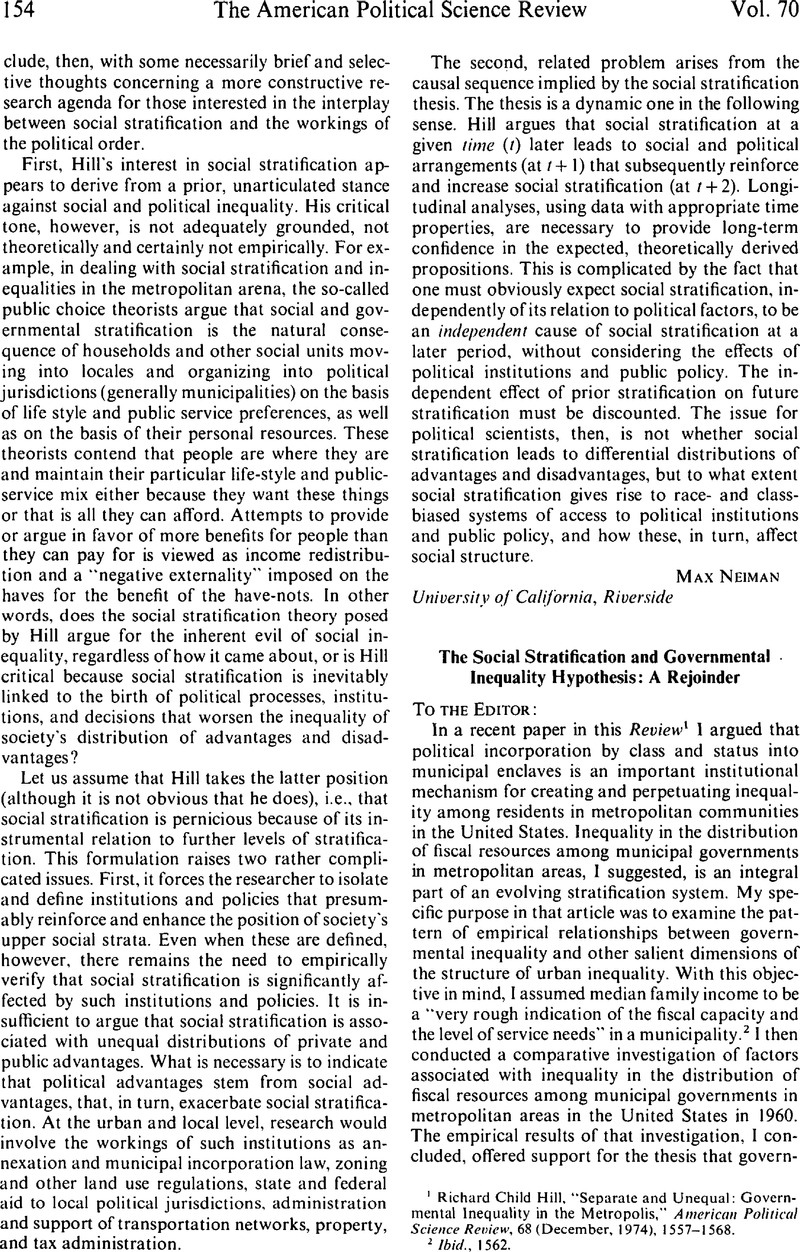Published online by Cambridge University Press: 01 August 2014

1 Hill, Richard Child, “Separate and Unequal: Governmental Inequality in the Metropolis,” American Political Science Review, 68 (12, 1974), 1557–1568 CrossRefGoogle Scholar.
2 Ibid., 1562.
3 There is a longstanding and continuing theoretical debate in the public finance literature over the most appropriate indicators of fiscal capacity among local governments. This debate. I might add, Neiman chooses to ignore. For arguments in support of personal income as a measure of fiscal capacity, cf. Robert Reischauer and Hartman, Robert, Reforming School Finance (Washington, D.C.: The Brookings Institution, 1973), pp. 32–34, 69–72 Google Scholar.
4 Gaffney, Mason, “What is Property Tax Reform?”, A merican Journal of Economics and Sociology (04, 1972)Google Scholar, and “Adequacy of Land as a Tax-Base,” in Holland, Daniel, ed., The Assessment of Land Value (Madison, Wisconsin: University of Wisconsin Press, 1970)Google Scholar.
5 Riew, John, “Fiscal Disparities in the Milwaukee, Wisconsin Metropolitan Area,” in Advisory Commission on Intergovernmental Relations, Fiscal Balance in the American Federal System, Vol. 2 (Washington, D.C.: Government Printing Office, 1967), Table 20, p. 299 Google Scholar.
page 158 note 6 Long, Norton, “The City as Reservation,” The Public Interest, (Fall 1971), 23 Google Scholar.
7 For incisive criticisms of the “public choice” model see, for example, Netzer, Dick, “Is There Too Much Reliance on the Local Property Tax?” in Peterson, George, ed., Property Tax Reform (Washington, D.C.: The Urban Institute, 1973), pp. 13–23 Google Scholar; Markusen, Ann Roell, “The Economics of Social Class and Metropolitan Local Government” (Ph.D. Dissertation, Department of Economics, Michigan State University, East Lansing, Michigan, 1974)Google Scholar; and K. Newton, “Social Class, Political Structure, and Public Goods in American Urban Politics,” Urban Affairs Quarterly, forthcoming.
8 In particular see The Committee on Economic Development, Reshaping Government in Metropolitan Areas (New York, 1970)Google Scholar; The Committee on Economic Devvelopment, Modernizing Local Government (New York, 1970)Google Scholar; The Advisory Commission on Intergovernmental Relations, Fiscal Balance in the American Federal System, volume 1 (Washington, D.C.: U.S. Government Printing Office, 1967)Google Scholar, and Advisory Commission on Intergovernmental Relations, City Financial Emergencies (Washington, D.C.: U.S. Government Printing Office, 1973)Google Scholar.
9 For the case of education, see Reischauer, and Hartman, , Reforming School Finance, p. 82 Google Scholar.
10 For a more detailed analysis of the state capitalist urban model see Richard Child Hill, “State Capitalism and the Urban Fiscal Crisis in the United States,” unpublished ms., Department of Sociology, Michigan State University, East Lansing, Michigan, July 1975.
11 For a comprehensive review of metropolitan reform attempts, see Bollens, John C. and Schmandt, Henry J., The Metropolis, 2nd ed. (N.Y.: Harper & Row, 1970), chapter 11Google Scholar.
12 O'Connor, James, The Fiscal Crisis of the Slate (New York: St. Martins Press, 1973), p. 103 CrossRefGoogle Scholar.
13 Harvey, David, Social Justice and the City (Baltimore: Johns Hopkins Press, 1973), p. 235 Google Scholar.
14 See, for example, Kirshner, Edward M. and Morey, James, “Controlling a City's Wealth,” Working Papers for a New Society (Spring 1973), pp. 10–19 Google Scholar.
15 For an excellent discussion of this issue see Friedman, Lewis, “City Budgets,” Municipal Performance Report (08, 1974), pp. 1–30 Google Scholar.
16 For one fascinating discussion of efforts in this direction see Wade's, Nicholas discussion of Community Technology, in Science (01 31, 1975), pp. 332–334 Google Scholar.
17 Hill, Richard Child, “Black Struggle and the Urban Fiscal Crisis,” paper delivered at the Conference on Urban Political Economy, New School for Social Research, New York, N.Y., 02 15, 1975 Google Scholar.
Comments
No Comments have been published for this article.